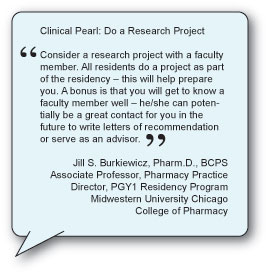
ACCP defines clinical pharmacy as the “area of pharmacy concerned with the science and
practice of rational medication use.” Under this definition, the opportunities for clinical
pharmacists are limitless. Many career options are available to pharmacists seeking clinical
opportunities within their scope of practice. As a clinical pharmacist, one can provide
general clinical services. However, a variety of subspecialty areas exist to encompass the
different patient populations.
Career Opportunities
Although all pharmacists must be knowledgeable about a wide variety of pharmacotherapy
issues, one can choose to pursue a generalized clinical career or one involving a subspecialty.
A pharmacist can choose to specialize within a certain area at any time during one’s career.
The following list includes the specialties in which clinical pharmacists may practice. Even
though this list is not all-inclusive, it showcases the variety and versatility of a clinical
pharmacy career.
Regardless of the subspecialty, a clinical pharmacist should possess:
- a desire to stay up-to-date with literature,
- an ability to critically evaluate literature,
- excellent communication skills,
- collaboration with other healthcare professionals,
- a desire to advocate for the patient and for the pharmacy profession,
- strong leadership skills.
For information on a specialty area, click on one of the links below.
ACCP Clinical Career Profiles
This online database allows you to explore the world of clinical pharmacy. Learn more about the many
career opportunities and specialty practice areas available to you as a clinical pharmacist. Review
profiles of active practitioners in various fields as you define your own professional goals.
Visit http://www.accp.com/stunet/profiles.aspx for more information.
Leadership Positions
As a clinical pharmacist, your opportunities to be a leader are greatly expanding. All pharmacists are
leaders in their everyday practices by successfully influencing the behavior of physicians, nurses,
pharmacy technicians, interns, support staff, and others to enhance medication safety and optimize
patient outcomes.
Formal leadership positions are also available to those interested. Within these roles, practitioners
may hold many different titles and responsibilities while working with other health care professionals
in promoting superior patient care:
- Clinical Pharmacist Specialist
- Clinical Manager
- Clinical Coordinator
- Clinical Pharmacy Operations Manager
- Pharmacy Supervisor
- Pharmacy Assistant Director
- Pharmacy Associate Director
- Pharmacy Director
Within these roles, practitioners may be responsible for:
- Providing leadership through development and involvement in clinical pharmacy consult services, drug informatics, and hospital quality initiatives
- Assisting in the development of a drug formulary and involvement in the Pharmacy and Therapeutics Committee
- Planning, developing, and providing drug information and educational sessions to professionals within the pharmacy setting, as well as to physicians, nursing staff, and other health care professionals
- Teaching, precepting, and mentoring students and residents
Academia and Clinical Pharmacy Careers
Clinical pharmacists interested in teaching at a college of pharmacy can do so. These clinical pharmacists
have dual roles: both as a clinical pharmacist and a professor of pharmacy. These pharmacists often
specialize within a certain area of pharmacy, and work at a clinical site in the area where the college
is located. Many faculty members provide didactic instruction to students as well as serve as preceptors
during their clinical rotations and other experiential training. Most colleges of pharmacy require at least
one year of residency to become a faculty member.

Pharmacy Informatics
A pharmacy informatist is a Pharm.D. who "employs health information and communications technology to develop
systemized approaches to patient care using evidence-based medicine and other clinical decision-making
tools." (ASHP) If you like information technology-related activities and see yourself helping to shape
health information technology, this may be a specialty career for you to pursue. Often, residency training
and/or a second degree such as business or health administration aids with this specialty.
For more information on pharmacy informatics please visit
https://www.ashp.org/Pharmacy-Practice/Resource-Centers/Informatics/Students.
Research-Oriented Careers
The demand for clinical pharmacist scientists is becoming more widespread within the healthcare arena.
Clinical scientists can oversee clinical development strategies, design studies, and analyze data for
publication. Other areas include participation and leading preclinical studies on new technologies, and
developing protocols for pharmacogenomics and biomarkers. Clinical research does not only involve a
“lab-type” research setting. Clinical research also involves studies of human subjects, not limited to
surveys, cross-sectional, case-series, case-control, cohort, and first-in-human studies, proof-of-principle
projects, and all phases of clinical trials.
Learn more.

Pfizer Guide to Careers in Pharmacy
This is an online resource that provides an overview of different fields in pharmacy. This introductory guide
is a good background resource for someone beginning his/her pharmacy education. Please click on the link below
for more information:
https://biology.wustl.edu/files/biology/pfizerpharmacycareerguide.pdf
ACCP Online Position Listings
Use this valuable resource to explore the many available opportunities, including residencies, fellowships,
clinical pharmacy practitioners, tenure-track clinical faculty, nontenure-track clinical faculty, pharmacy
managers, pharmaceutical industry positions, graduate programs, and academic administrators, on the ACCP Web
site at
http://www.accp.com/careers/onlinePositionListings.aspx.